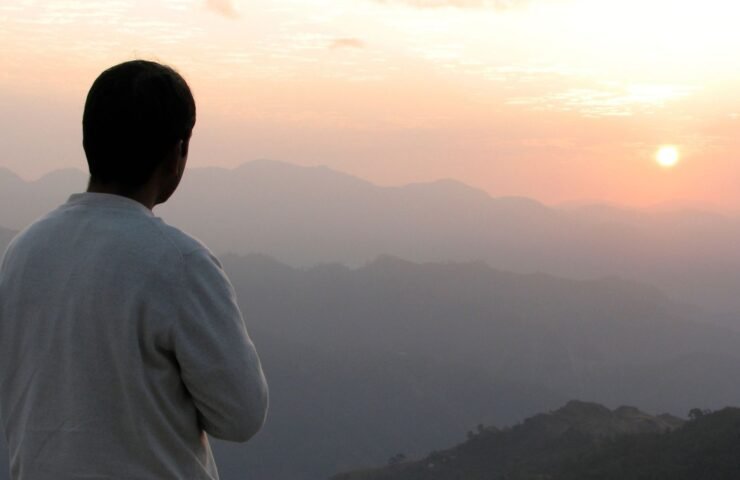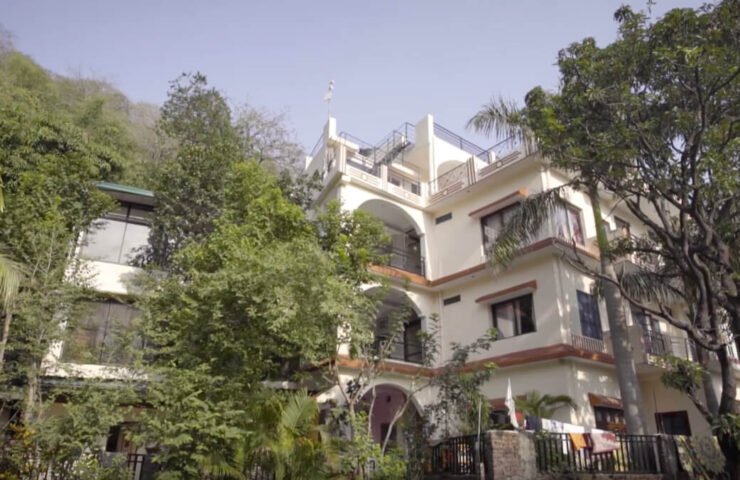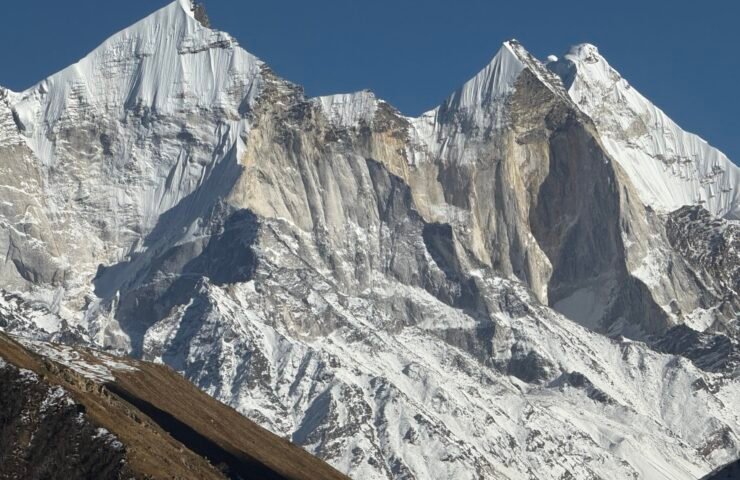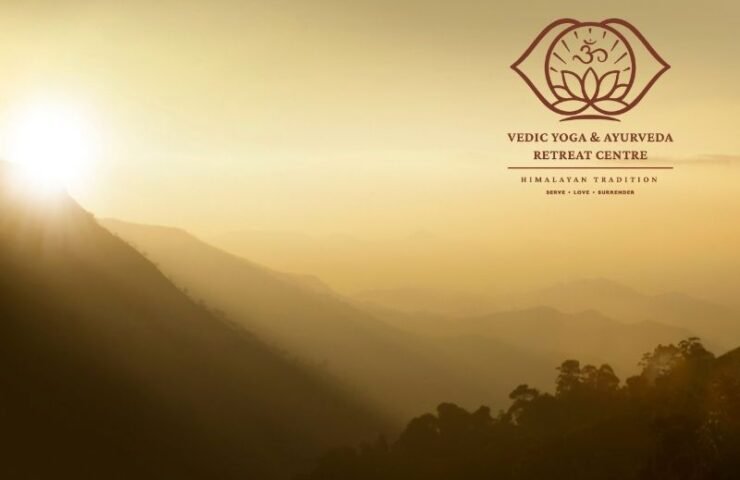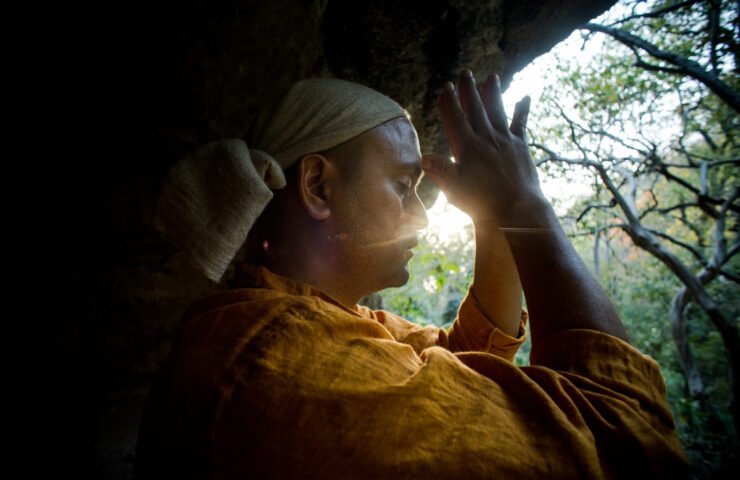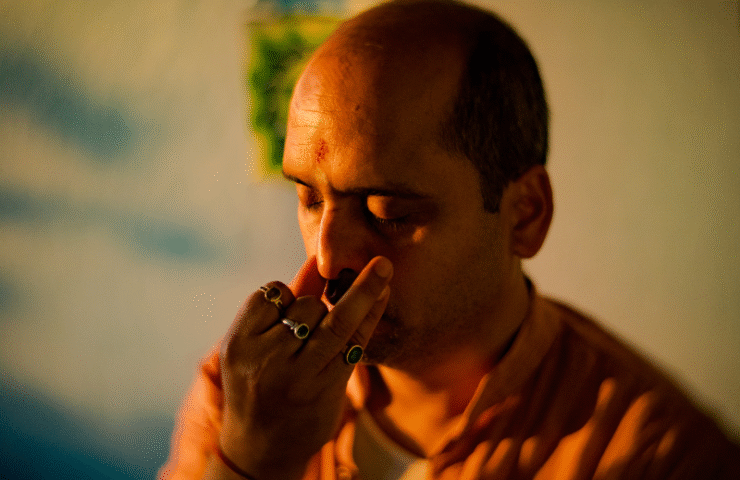Experience the Himalayan tradition
The Vedic Yoga Centre is a place of inner science
You will get a unique opportunity to discover your own inner power through the authentic Himalayan wisdoms offered by a Master with over 22 years of experience.
We emphasise working with small groups to ensure personalised attention during your program. It draws on both the ancient theory of yoga, and modern knowledge of the body and mind.
Combined Yoga Teacher Training Course
The 500-Hour Yoga Teacher Training Course at the Vedic Yoga Centre is a complete and intensive journey for sincere practitioners who wish to immerse themselves fully in the Himalayan yoga tradition. This combined yoga teacher training in Rishikesh combines our 200-hour and 300-hour programs into a single, transformative seven-week course. It offers the depth of Vedantic, Tantric, and classical yogic wisdom, adapted for modern life, to help you experience yoga as a living practice.
A Complete Path of Transformation
This residential course offers intensive study and consistent discipline over seven weeks, creating a routine that integrates yoga into the daily lives of students.
Guided by experienced Himalayan teachers, the program goes beyond physical training to awaken awareness, trust, and confidence through direct experience. Students gradually develop the ability to share from their genuine experiences, rather than relying on pure understanding.
Yoga Alliance Certified & Internationally Recognised
The 500-hour Yoga Teacher Training Course in Rishikesh is fully accredited by Yoga Alliance USA, enabling graduates to teach worldwide. It offers a comprehensive understanding of:
- Progression from basic to subtle asana, pranayama, kriya, bandha, and mudra practices
- Yoga philosophy, Vedanta, and Tantra
- Traditional mantra and meditation
- Anatomy, teaching methodology, and applied teaching practice.
This course lays the foundation for both physical development and inner growth, enabling students to share the teachings at a deeper level.
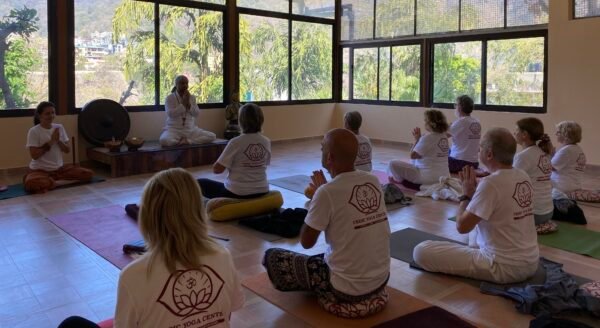
Join our Experienced Yoga Journey
If you wish to experience the essence of time-honoured yoga, this 500-hour Yoga Teacher Training in Rishikesh can help transform both your practice and your life. In addition to becoming a certified yoga teacher, you will embark on a spiritual journey of discipline, self-reflection, and inner awakening within the ancient Himalayan yoga tradition.
Personal Attention
At the Vedic Yoga Centre, we maintain small class sizes to ensure personalised guidance for all students on their yogic journey, resulting in a deepening state of self-awareness.
Our peaceful Himalayan setting, combined with Ayurvedic vegetarian meals, clean accommodation, and a community of dedicated practitioners, supports the body, mind, and energy throughout this intensive program.

Register now to experience this transformative program
Syllabus of 500 hour YTTC
All modules from the 200 and 300 hour Yoga Teacher Training Courses are combined in this program. A brief outline of the content is set out below, but for full details of the modules, please visit our 200 hour and 300 hour pages on our website under the Syllabus/Course Outline headings.
Techniques, training & practice
- Hatha yoga practices: asana, pranayama, bandha, mudra and yoga nidra based on the Hatha Yoga Pradipika and Gherand Samhita
- Kundalini kriya practices and deeper-level mudra practices
- Mantra chanting – how to practice chanting mantra combined with japa meditation, and how to instruct other
- Meditation (Vedic Dhyan) – how to practice and teach others
- The art of teaching others and assisting different combinations of students
- Learning how to prepare for workshops and retreats
- Learning the Pyramid method for developing intensity of focus
- Applying the Class Structure of 7 Elements (mantra, meditation, pranayama, asana/bandha, kundalini kriya, prana dharana/sakshi bhava, yoga nidra)
- Developing the art of sequencing
Teaching methodology
- Teaching the Full Spectrum of Yoga – Mastering how to teach all aspects of yoga: asana,
pranayama, kriya, mantra, mudra, and meditation.
Tailoring Classes to Student Needs – Utilising the different aspects of yoga to design
classes suited to the nature and experience of students. - Safe Adjustments and Use of Props – Developing skills to safely adjust and assist
students, incorporating the effective use of props. - Preparing the Body for Meditation – Understanding how to use postures to prepare the
body and mind for meditation practices. - Holistic Program Design – Learning to prepare and teach Hatha Yoga and Kundalini Kriya
programs, and integrate both with mantra in a single class. - Understanding Vedic Yoga – Developing a deep understanding of Vedic Yoga and its
holistic approach to well-being and self-transformation. - Pyramid Method for Awareness – Exploring the Pyramid Method (the art of upward-moving
awareness) to ground awareness in the morning, enhancing focus throughout the day. - Class Structure: The 7 Elements of a Vedic Yoga Class – Observing and practising the
seven elements of a Vedic yoga class. - Advanced Adjustments and Assisting – Refining adjustment and assistance techniques
with a deeper understanding of different ways of working with the body. - Vedic Yoga Sequencing – Mastering the principles of Vedic Yoga sequencing to create a
holistic flow that leads to stillness, including sequences for mixed-level classes. - Kundalini and Tantric Kriya Practices – Exploring combinations of Kundalini and Tantric
Kriya practices to awaken life force energy and inner consciousness. - Principles of a Vedic Yoga Class – Understanding the Centre’s approach to integrating all
traditional yoga aspects into one cohesive practice. - Creating the Teaching Environment – Learning to build an appropriate atmosphere for
teaching in varied environments and to diverse groups. - Building Confidence and Command – Developing confidence in delivering clear,
appropriate commands while overcoming personal limitations. - Inspiring and Motivating Students – Adopting a systematic approach to connect with,
inspire, and motivate students. - Developing an Authentic Teaching Style – Cultivating a unique teaching style rooted in
your own experiences and genuine understanding of yoga. - Carrying the Right Attitude – Nurturing the right mindset to effectively transmit teachings
with authenticity and humility.
Combining eastern & western approaches to anatomy/physiology
- Medical anatomy and physiology, how the practices affect the different systems of the body and lead to one’s well-being
- Astral anatomy and physiology which provides a deeper perspective of the layers of the body and how these are affected by the different practices
- The significance of the mind in astral anatomy and how one can access its subtle dimensions
- How the Eastern and Western approaches together can lead to one’s harmony
Applied yoga philosophy, lifestyle & ethical living
- The four paths of yoga
- Excerpts from Patanjali Yoga Sutras
- Brief outline of Hatha Yoga Pradipika and Gherand Samhita
- The right and left hands of Tantra
- Vedanta
- Selected sutras from Bhagavad Gita
- How to build an Ayurveda lifestyle and maintain ethical behavior
Practice teaching
Applying all of the techniques studied in the 200 and 300 hour courses to both individuals and larger groups, while building trust and confidence in one’s role as a teacher
Self-study/seva (selfless service)
Self-study time is allocated each day.
Students are required to finish their assignments either during the course or submit them online within 60 days of completion of the program
Students will be asked to provide feedback on their personal experience of their practice teachings sessions
Students must continue a routine of daily sadhana (practice) for a minimum of six weeks after returning home
Students must complete a written exam and return this online within 60 days of completing the course (we expect students to complete this task ethically)
During the course, students will be requested to undertake seva (selfless service) according to tasks that require completion at the Centre; and learning how to carry this attitude of selfless service into all different aspects of their lives
Everything you need to know about the Vedic Yoga Centre Rishikesh to help you choose this course
Our Schools's Yoga Alliance Accreditation

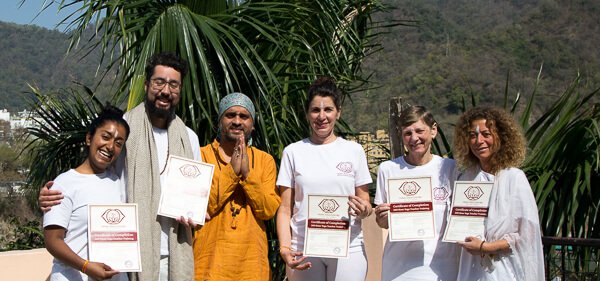
We are committed to your health and well being
Himalayan Tradition
A science based on the ancient teachings of Vedic & Tantric wisdom
Years of experience
Highly experienced teacher with more than 22 years of mastery
Holistic approach
Synergetic combination of yoga & ayurveda practices
Certified therapists
Authentic Ayurveda Kerala Certified therapist
Join the journey
Prices and inclusions for 500 Hour Yoga Teacher Training Course in Rishikesh, India (7 Weeks)

Private standard room
Our entry level accommodation
US
$3700
(333 600 INR)
- Yoga course
- Yoga Alliance Certification - RYT 500
- Individual consultation with Master
- One Ayurveda treatment
- Breakfast, Lunch, Dinner
- Single / Double bed
- Shower / Hot Water
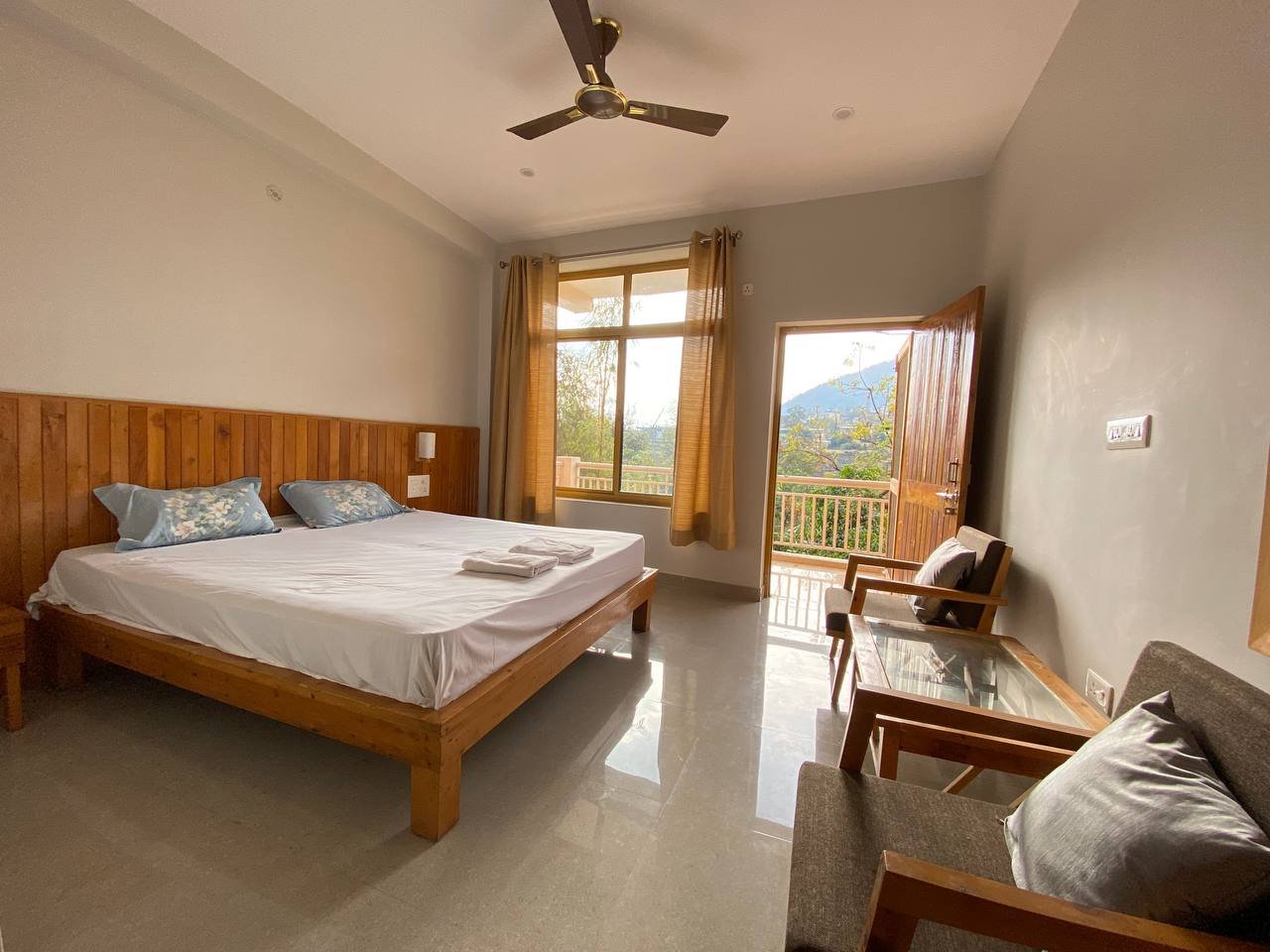
Private deluxe room
Facing the foothills of the Himalayas
US
$4700
(423 700 INR)
- Yoga course
- Yoga Alliance Certification - RYT 500
- Individual consultation with Master
- One Ayurveda treatment
- Breakfast, Lunch, Dinner
- King Bed
- Shower / Hot Water
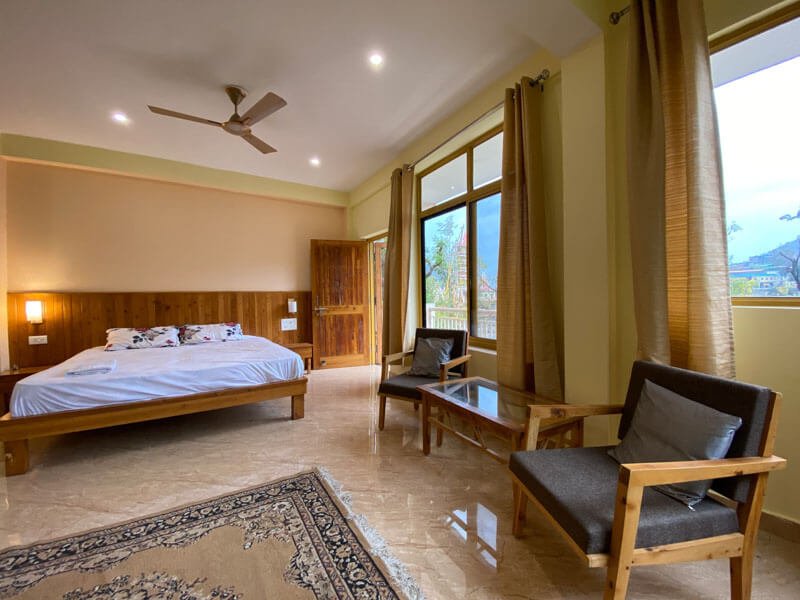
King deluxe room
With additional kitchen bench space
US
$5440
(490 700 INR)
- Yoga course
- Yoga Alliance Certification - RYT 500
- Individual consultation with Master
- One Ayurveda treatment
- Breakfast, Lunch, Dinner
- King Bed
- Shower / Hot Water
Dates
- April 1 – May 19, 2026
- February 1 – March 22, 2027
To book your spot, a deposit of USD 300$ (INR 26 000) is required.
Terms and Conditions.
ARRIVAL FOR THE COURSE
ARRIVAL FOR THE COURSE
You should arrive at least one day before the Course starts to ensure that you have overcome any jetlag from your flight, and you are refreshed for your program. In any case, all students must be present on the evening before the Course starts.
This course can be completed as two 100-hour courses, but the second part must be completed within 12 months of the commencement of the first part. Each 100-hour component runs over 15 days.
REGISTRATION
Email us a copy of your flight details, passport and visa, and complete the Application Form by following the Apply Now link, which includes payment of your deposit.
One Ayurveda treatment of
your choice included
Abhyangam
Whole body oil massage
• Improves circulation
• Revitalises skin health
• Provides deep muscle relaxation
• Includes lymphatic drainage
• Supports the nervous system
Relaxation therapy with warm oil
Shirodhara
• Provides deep relaxation and overcomes insomnia
• Helps with stress, depression and schizophrenia
• Diminishes hypertension
• Helps overcome hemiplegia (paralysis)
• Helps against diabetic complications
Herbal hot bundles massage
Patra potli
• Detoxifies the skin & regenerates the entire body
• Eliminates pain associated with muscles of the shoulder and back.
• Improve circulation
• Detoxifies the body through induced perspiration
• Provide deep muscle relaxation
• Revitalises skin health
We offer a holistic approach

Yoga practices
Science of Vedic Yoga & Meditation

Ayurvedic therapies
Complete approach to rejuvenate body & mind

Accommodation
Peaceful stay in the Himalayan foothills
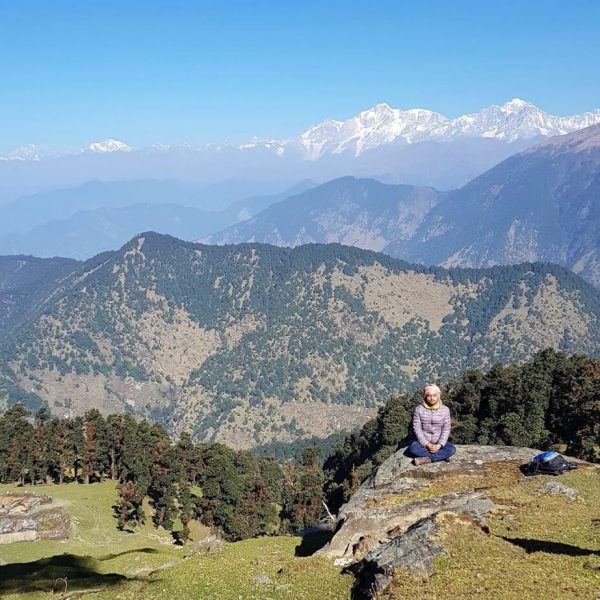
Pilgrimages
Himalayan Sacred Walks to Gangotri & Badrinath
Yoga means union – your union with the present moment, and the basis of that union is your peace and equanimity.
Shailendra Singh Negi
About the 500 hour YTT Course
Daily schedule
This schedule is a sample only and is subject to modifications according to circumstances and the understanding of the students.
6:30 am - 7:30 am | Mantra chanting and meditation |
7:30 am - 9:30 am | Hatha yoga – asana, pranayama, samyak kriya, yoga nidra, meditation |
9:30 am - 10:00 am | Breakfast in silence |
11:00 am - 1:00 pm | Lecture/discussion 1: yoga philosophy, lifestyle, ethics, teaching methodologies |
1:30 pm - 1:30 pm | Study time |
1:30 pm – 3:30 pm | Free time – study time, journaling and preparation of assignments |
3:30 pm - 4:30 pm | Practicum |
5:00 pm - 6:30 pm | Kundalini kriya class |
7:15 pm - 7:45 pm | Dinner |
8:00 pm - 9:00 pm | Kirtan / satsang /silent meditation |
9:30 pm | Sleep |
Attendance at all classes is compulsory.
Every Sunday will be free between the morning hatha yoga class and the evening kirtan session: from 9:30 am to 8:00 pm.
Eligibility
- This course is for students who are seeking to enhance their practical understanding of yoga so that they can teach others based on their firsthand experiences rather than relying only on theoretical knowledge from books.
- You should prepare for your arrival by familiarising yourself with two of our YouTube videos: A 20-minute morning kriya yoga practice and Sequence of 7 Best Asanas which you should practice as often as you can
- Cultivate the ability to sit calmly and quietly in a cross-legged position.
- Remain open-minded, as our teaching methods may differ from your expectations.
- Be ready to reflect upon the timeless ancient practices and teachings, rather than passively accepting what is presented.
- Be prepared to broaden your understanding of yoga, particularly embracing it as a holistic science rather than an elaborate exercise program.
Yoga Certification
Upon completion of this 500 hour Yoga Teacher Training Course you will receive a Certificate of Completion from the Vedic Yoga Centre. You will also be eligible to register with Yoga Alliance as an RYT 500.
The designation RYT means a yoga practitioner who has completed 200 hours of yoga teacher training. An RYT 200 certified yoga practitioner follows the guidelines adopted by Yoga Alliance (USA).
What is included in your course fee
The Vedic Yoga Centre’s 500-hour Teacher Training includes the following:
- Certificate of Achievement from the Vedic Yoga Centre, once you have successfully completed the Course.
- Certification requirements include:
- Full attendance in the training intensive
- Completion of the required readings and assessments;
- Successful completion of examinations and written assignments;
- Completion of the post-course requirements.
- Vedic Yoga Centre Manual.
- Accommodation in modern rooms at the Vedic Yoga Centre, each with an attached bathroom. You will have a separate room, either standard or deluxe, according to your request or availability of rooms.
- Three Ayurvedic meals per day (please let us know in advance if you have any specific dietary requirements)
- Use of the Centre’s Wi-Fi.
- One free Ayurvedic treatment of your choice.
- The opportunity to transform your life and become a part of a Vedic yoga community comprised of students from around the world.
- Individual consultation and guidance from teachers to help you customise your practice, find inspiration, and make lifestyle choices which heal and empower you at every level.
The prices do not include airfare, transfers to and from the Centre, tips, any excursions during the course, or personal items
About the Vedic Yoga Centre Rishikesh
Traditional teachings for modern times
The practices we offer present a holistic approach to the concept of yogic, Tantric and Vedic practices and understandings, which encompass one’s total well-being through a range of different systems, and are collectively known as Vedic Yoga – yoga in its traditional, pure form, without any dilution. Its essential focus is how students can redirect their awareness back to its source – to the soul, so that they can experience what it means to be complete. It is a traditional science based on the teachings of the Vedas which were written approximately 1500 to 1000 BC. The Vedas show us how to return to our true nature through various methods and techniques which have been tested throughout the ages.
Our Centre offers different sets of yogic practices which include kundalini kriyas (also known as samyak kriya, or Tantric kriya), hatha yoga (asana, pranayama, bandha, mudra and yoga nidra), and Vedic dhyana – the ancient Himalayan approach to systematically developing your concentration (dharana) so that you can to experience the higher state of meditation (dhyana).
We specifically offer the Himalayan traditional teachings – the Himalayan Living Wisdom, and the art of conscious living. The various methods are delivered in a way that help students to learn to live without fear, and become spontaneous with life so that they can experience that their life does not need to be a struggle, but can become one of joy and bliss.
AYURVEDA
The Ayurvedic experiences that we offer, show alternative methods for participants to detoxify their body and mind, as well as provide an understanding of both the theory of Ayurveda and its practical application in day-to-day life. It also shows how these can be combined with the yoga practices that we offer, for overall health and well-being.
SACRED WALKS
The presence of the Himalayas is a centre of non-verbal teachings – from the ages spiritual seekers, practitioners have come to the Himalayas for solitude, and to develop and raise their inner consciousness. For thousands of years these mountains have been recharged with the spiritual vibrations of these yogis, masters and sages. The Himalayas welcome all people. Receiving the teachings of the Himalayas does not require any intellectual understanding about the Himalayas themselves or these teachings – it requires only the sincerity and presence of mind of the seeker.
The Centre offers these Sacred Walks as an opportunity for all students to receive the grace of the Himalayas.
Holistic Experiences
All of our different programs offer a systematic and holistic approach for students to work with the different layers of their existence. They guide students from the gross (the physical) to their subtlest level of existence, allowing them to realise and experience that they are deeper than their physical body.
In addition, students learn that all of the practices have one and the same purpose: to holistically integrate the mind, body and spirit, which awakens in them the ability to live their yoga in all dimensions of life, on a moment-to-moment basis, and gives them an attitude that will help them to serve, love and surrender – these three attributes incorporate the fundamental philosophy and vision of our Centre.
Philosophy and Vision
Our Philosophy
At the Vedic Yoga Centre our fundamental philosophy and vision is based on how you can maintain your awareness from moment-to-moment so that you can experience your union through the different circumstances of life. Then your own genuine experiences will awaken your faith from within, which will transcend your understanding of the philosophy into your experiences so that you don’t simply understand or just believe them.
We aim to make students aware that the Truth resides within themselves, and by integrating the body, breath, mind, senses, energy and emotions through systematic training, discipline and determination, they can experience equanimity which can help them to redirect their awareness from outward to inward – back to its Source.
We are not simply offering academic lessons on the Upanishads, the Bhagavad Gita, the Patanjali Yoga Sutras or other philosophical scriptures. Our aim is to enable students to learn how all these different aspects of the philosophies can help them to access their inner nature. All of these philosophies have come from the rishis, yogis and sages who were the spiritual scientists, and whatever they have been given has come from their genuine experiences. All we need to learn how to tune our consciousness so that we can connect with these teachings at a deeper level.
The Vedas are the wisdom, and the practices are the tools which help to awaken this wisdom within you. The result will bring harmony between your thoughts, emotions and actions, which helps you experience a life without fear, and one of peace, happiness and contentment. It helps you to live in harmony with nature and your surrounding environment, and helps you to experience oneness in all of your relationships.
Yoga is the underlying thread of all different spiritual traditions which unites them all as One. This One is not a numerical one – it is the Infinite One.
Our Vision – An ancient yogic vision for modern times
The vision of the Vedic Yoga Centre is to connect the ancient yogic teachings to the present times by becoming aware of the difference between your understanding and your experience. This experience can be realised through the integration of all the different aspects of yoga into one thread, which has one essential purpose: to experience one’s total well-being. Instead of just passing information on to students, it offers a systematic approach for dealing with the complexities of modern life, and focuses on how they can transform their lives as their yoga becomes their living experience. The teachings do not ask you to believe anything; they are simply focused on initially understanding the practices, and then applying them to themselves so that their belief comes from their own experience. Understanding is the initial step which inspires and motivates you, so that you can continue and become consistent in your practice and experience the teachings; then they become a part of your actions, and begin to transform your life.
Come and join us for one of our programs to experience this vision.
Location
The Vedic Yoga Centre is located on the banks of the holy river Ganga in the small town of Laxman Jhula, Rishikesh, in the foothills of the Himalayas.
Rishikesh is regarded as the Yoga Capital of the World and is just six hours by car, train or bus from Delhi. The Centre is a peaceful oasis for learning and practicing the ancient science of yoga, specifically Vedic Yoga and Ayurveda. For full details of where to find us, see
Directions to our Centre
Accommodation gallery
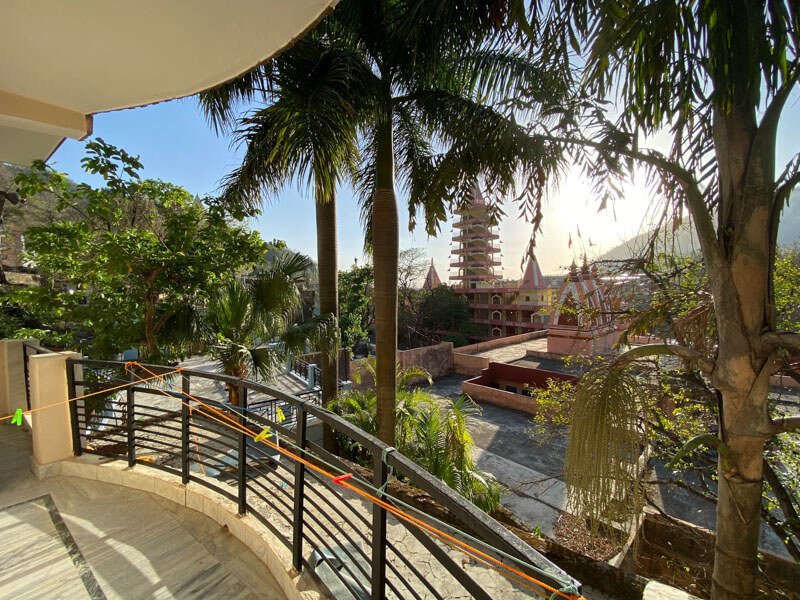

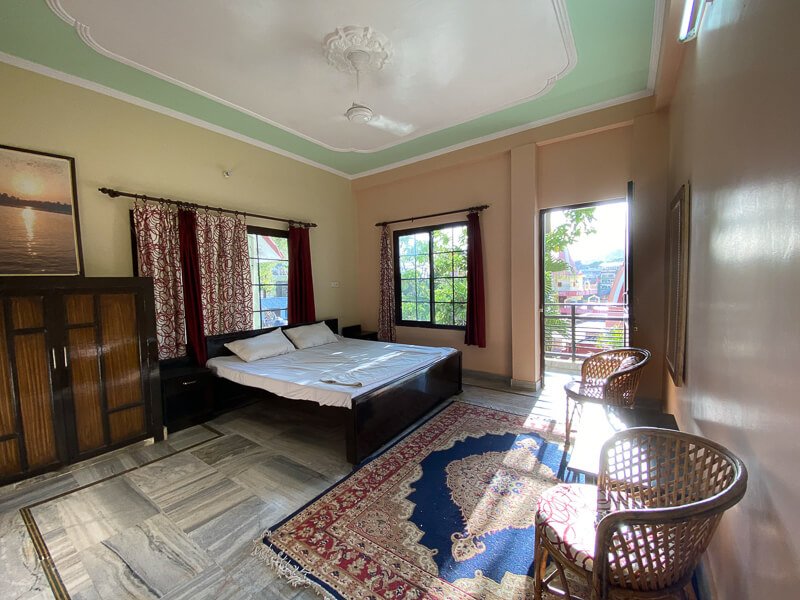
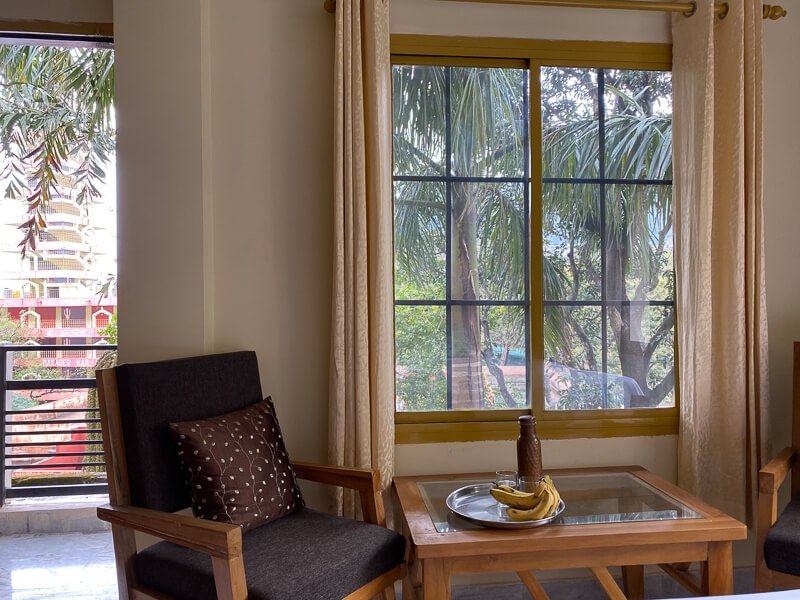
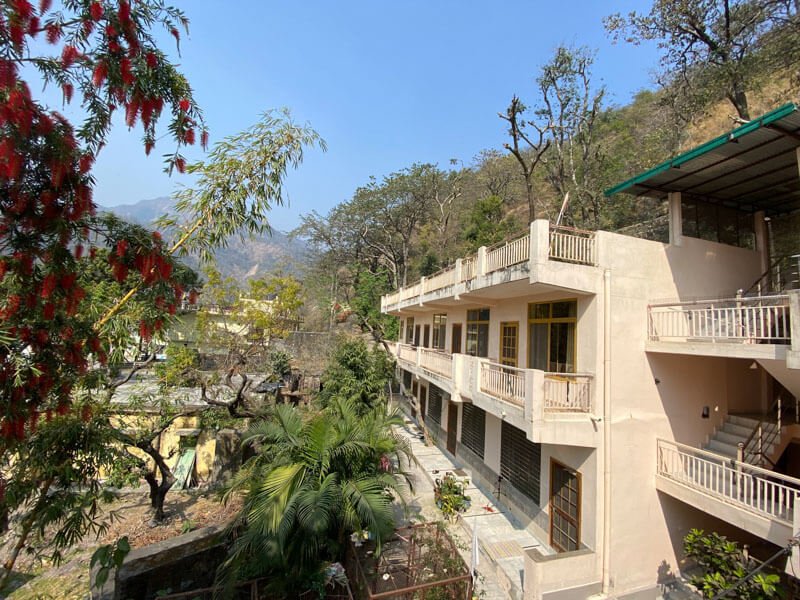


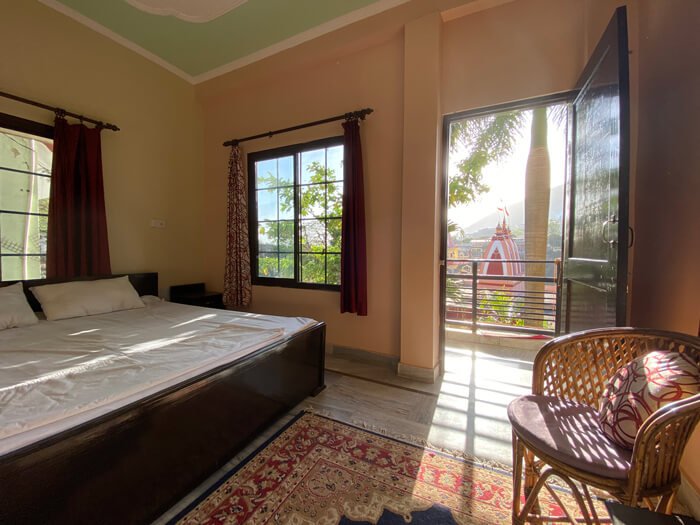
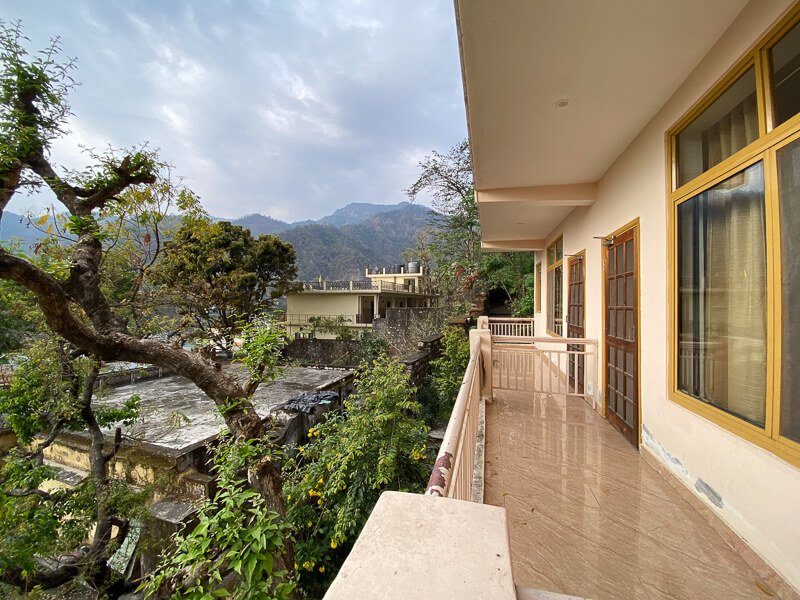
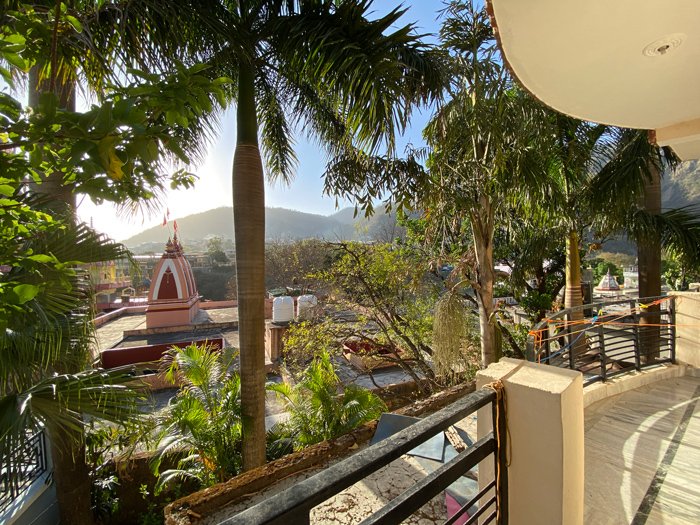
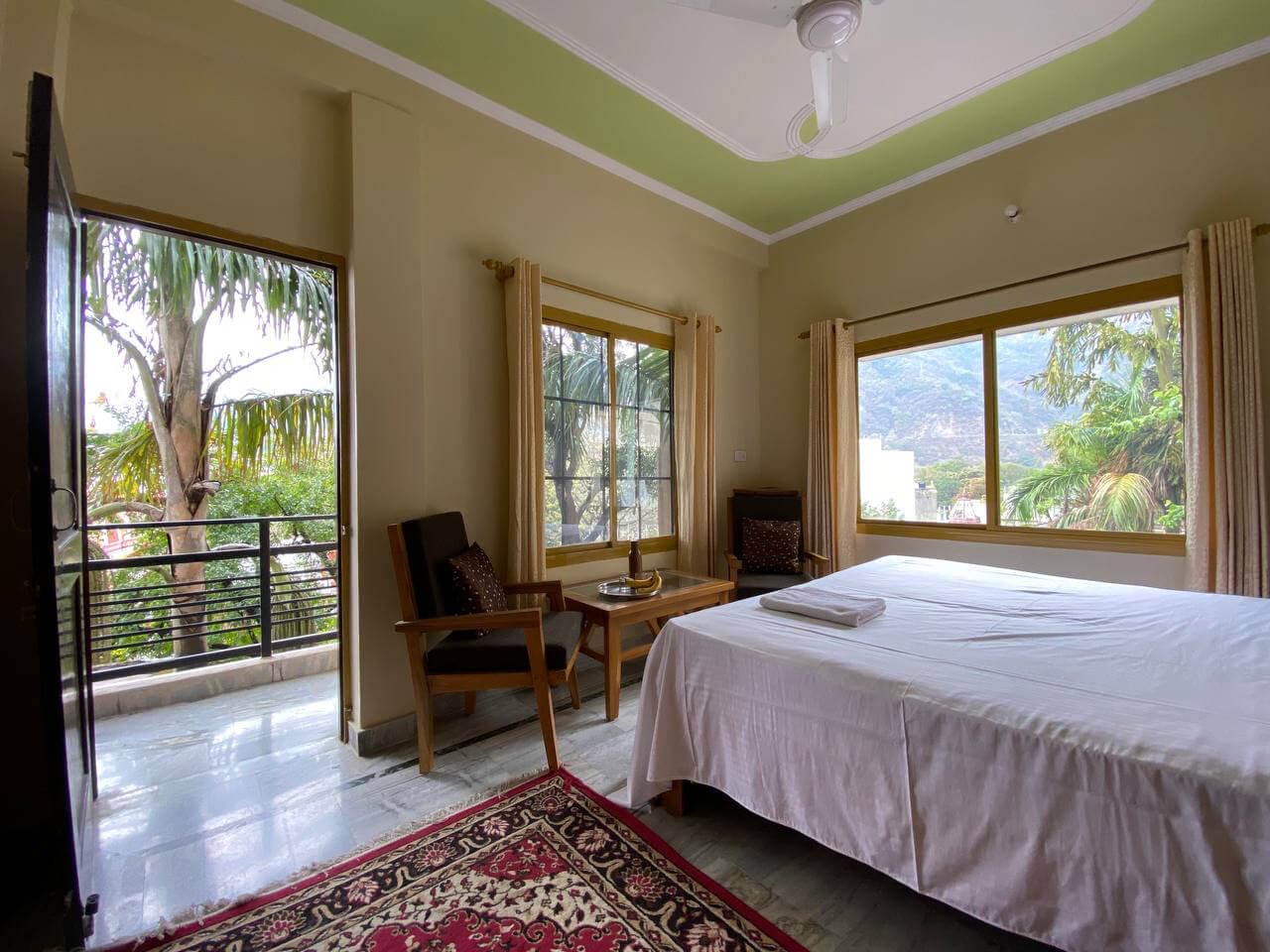
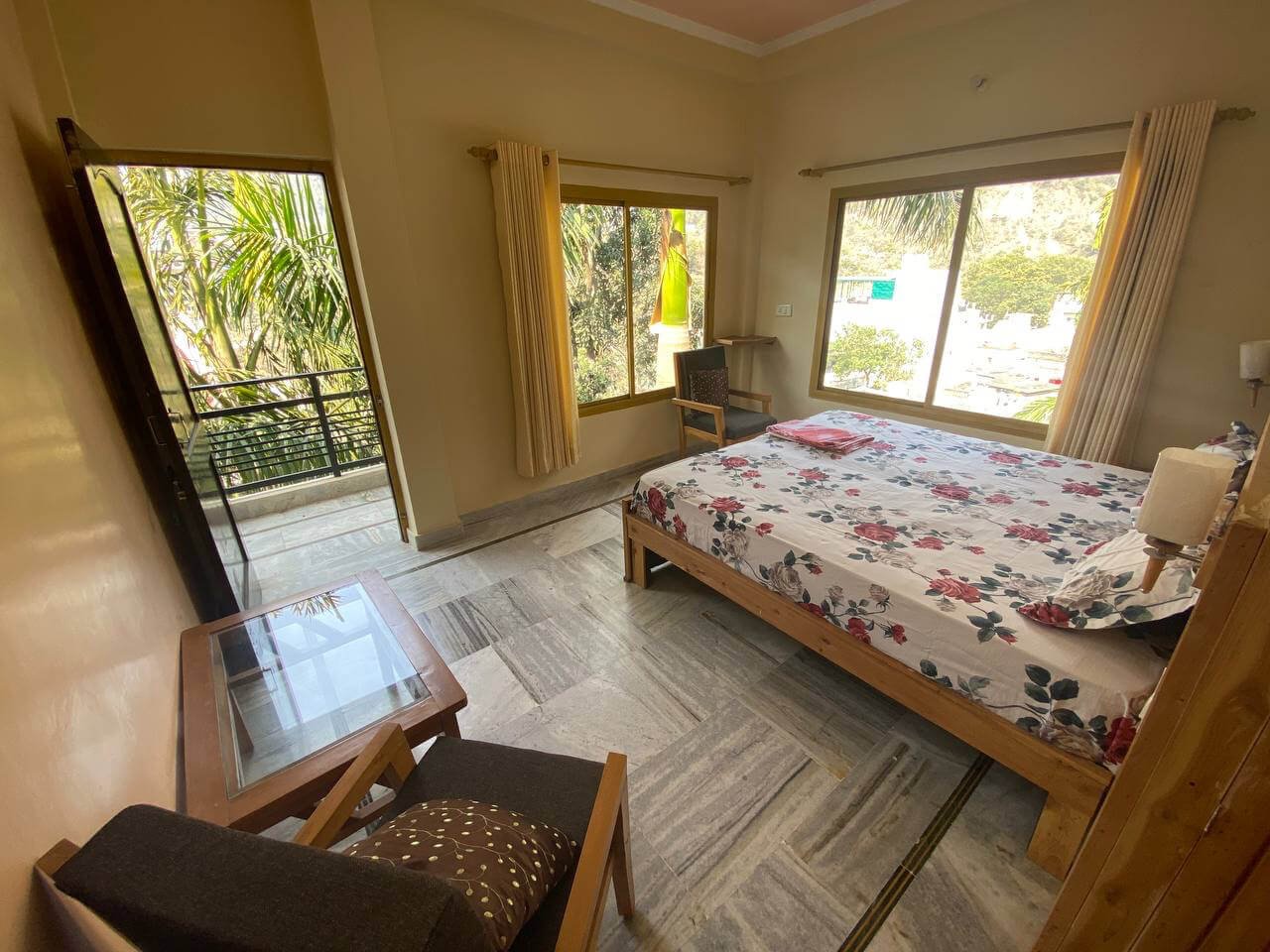
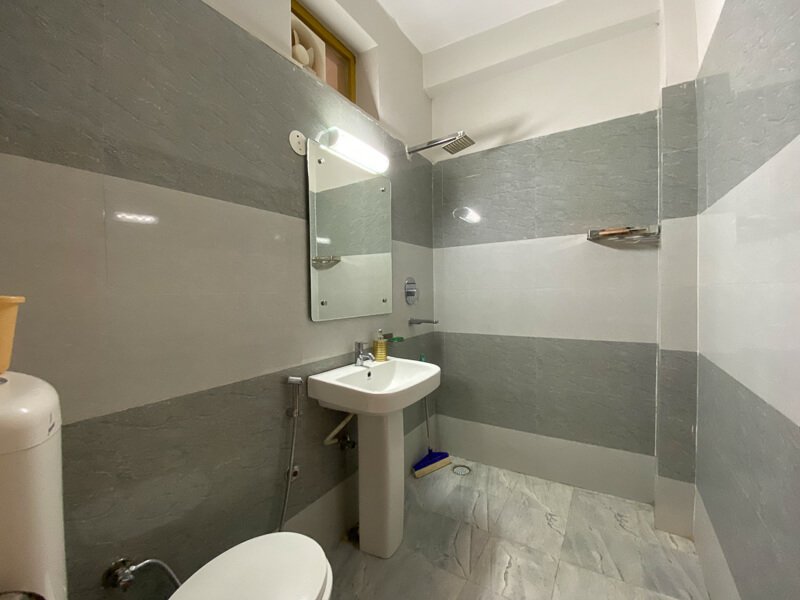
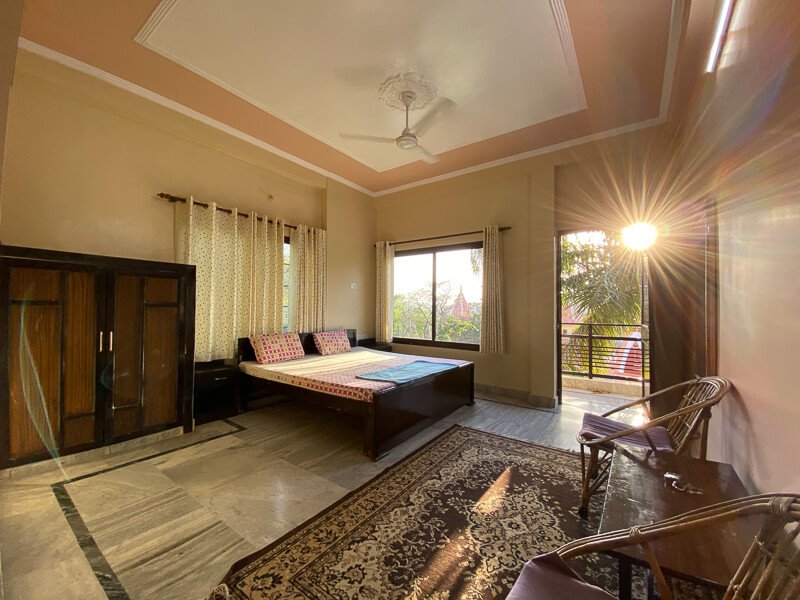
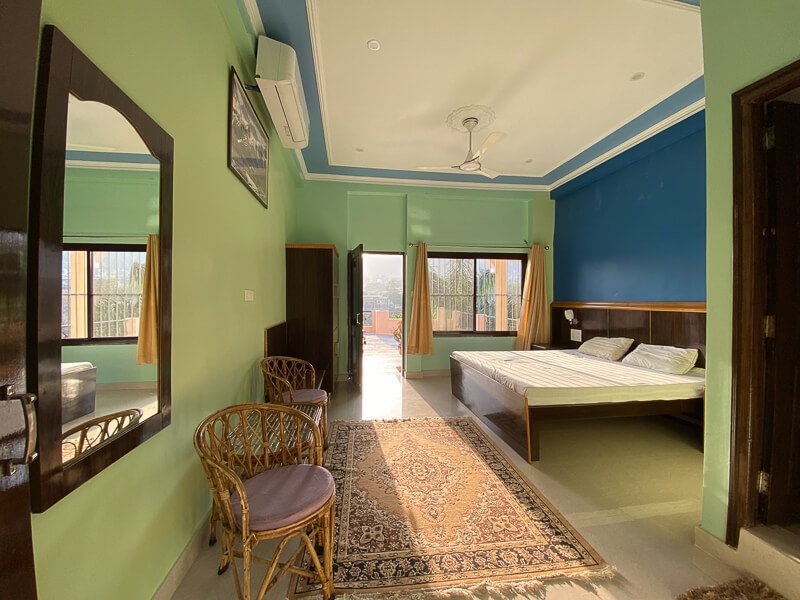
Blog
Get inspired
Testimonials
I stayed at the Centre for just over one week for a short introductory course on Ayurveda massage with Rajendra and practiced Kriya Yoga every morning with Shailendra. It was a great experience, the whole family made me feel at home, they helped me to learn the techniques and let me patiently practice on them, fed me genuine and delicious food and there was often time for interesting discussions about Indian culture, psychology, philosophy, spirituality, mindfulness and many other interesting topics. It was a 360 degrees experience where you really appreciate their knowledge and dedication. The centre is clean and quiet, surrounded by greenery and right on the Ganga river banks, conveniently located in front of the Laxman Jhula.
Barbara
FAQ's
Our surrounding environment
There are many reasons to stay at the Vedic Yoga Centre for your Teacher Training Course. Aside from the traditional teachings, you will have access to the following:
- Holy River Ganga-ji – simply walk down the driveway of the Guest House, and you are only a few steps away from the holy river Ganga. You can sit by this sacred river at any time due to its proximity to our Retreat Centre.
- Views of Ma Ganga – if you want picturesque views of Laxman Jhula, then simply walk to the rooftop of our building and take in the breathtaking views of Ganga-ji and the surrounding mountains.
- Ram Jhula is only a 15-minute walk away.
- Vashishta Gufa – a sacred cave for those seeking deep mediation, only 25 kilometres from Rishikesh. In this cave the great Sage Vashishta (held to be the son of Lord Brahma, and one of the Seven Great Sages), meditated.
- Tattwala Baba-ji cave – a sacred place where the Himalayan master lived and performed austerities. If you are receptive, you can just sit down and feel the energy, which has the power to make a shift inside you.
- Dehradun (Jolly Grant) airport – the closest domestic airport which is only 29 kilometres (approximately 50 minutes by car). You can fly to Dehradun direct from Mumbai, Dehli and many other smaller cities in India.
Getting to Rishikesh, India
How do I get to the Vedic Yoga Centre in Rishikesh?
Details of how to get to our Centre from either Delhi or Mumbai airport are shown on our Contact Us page through the following link: https://vedicyogacentre.org/contacts/
What travel documents do I need to enter India?
You will need a valid passport and, depending on your country of origin, a Visa to enter India. Even though India now offers “Visa on Arrival” facilities to many countries, we highly recommend you get a 6-month Visa before you travel. You must request a tourist visa, as a study visa is only applicable to long term studies at appropriately accredited facilities.
What is the address of the Vedic Yoga Centre?
If you are asked by Indian officials where you are staying, you should give the following address:
Vedic Yoga Centre
36 Neelkanth Road,
Laxman Jhula, Rishikesh 249302
UTTARAKHAND, INDIA
Which airport should I arrive at?
Delhi International Airport is the closest airport and provides the easiest access to Rishikesh, and from here you can arrange a flight to Dehradun domestic airport. However, if you arrive at Mumbai then you need to arrange a connecting flight to Dehradun domestic airport. From here we can arrange a taxi for you on request for a cost of around 1,500 Indian rupees. To arrange a taxi please write to us at myvedicyoga@gmail.com
The weather in Rishikesh
General weather conditions in India
December, January
These two are the coldest months of the Year with temperatures from 5-20°C. Nights are cold but days are pleasant in the sun. Warm clothing is recommended.
February, March, and April
These months are very comfortable with a lot of sunshine. For the month of February you should still have some warm clothing, but light clothing is fine for March and April.
May, June
In these summer months, temperature are between 30-40°C all of the time. It is also humid most of the time, so light clothing is recommended.
July – August
This is the monsoon time which brings the temperature down a bit thanks to the rain, but it is still very humid. Light clothing with rain gear is recommended.
September, October, and November
As the monsoon slows down, temperatures stay between 32 and 35°C, but nights become pleasant in September. During October and November, the weather stays mild. Light clothing for September and October but moderately warm clothing for November is recommended.
What should I bring?
What should I pack?
- You should pack lightly – one suitcase and one carry-on backpack is adequate for most people. Determine the kind of clothing you will wear both to yoga classes and all the other activities and studies you will participate in.
- Make sure that your clothing is modest, comfortable, and appropriate, both for the culture and the weather conditions. It is always useful to have some cold weather clothing for sudden cool changes. In any case, clothing is easily available locally at very reasonable prices.
- During Winter, bring adequate thermal underwear and a winter jacket, warm socks and other items you may need.
- Bring appropriate shoes for walking in the forest.
- Bring an umbrella and raincoat in the rainy season.
- Bring your own personal requirements such as toiletries, hygiene requirements, medications, vitamins etc. that you specifically require. Many of these products are available locally.
- Make sure that you have all the adaptors, chargers and batteries etc. required for your phone, computer, camera etc. and any other technological equipment you require.
- Bring a notebook and pen to take notes during lectures, although these are also available locally.
- Have a re-usable water bottle for drinking water.
- You can do your own laundry or take your washing to a nearby laundry where clothes are washed for a small fee.
Accommodation and meals
ACCOMMODATION
Do you allow smoking in the rooms?
Alcohol, smoking, the use of drugs, and loud music are all strictly prohibited – not just in the rooms, but anywhere on the site.
Do the rooms have separate beds so that I can share a room with a friend?
We encourage students to avoid sharing a room as the 200-hour YTTC requires you undivided attention, and students often that they are distracted if they share a room, even with their partner.
Are all the rooms the same?
We have different categories of rooms – standard and deluxe. All rooms have an attached bathroom with hot and cold running water, a shower and a Western-style toilet.
Do all the rooms have air conditioning?
We have only four (4) rooms with Reverse Cycle Air Conditioning (both heating and cooling). However, all rooms have ceiling fans. You can rent a heater from us for a fee if you need one.
Do all the rooms have views?
We have a total of twelve (12) rooms that face the Ganga, but only a few of these have direct views to the Ganga itself. We have six (6) rooms that face the back, towards the hills.
Do all the rooms have access to WiFi?
Wi-Fi is available in all the common areas on site, but not in every room. Some rooms have been specifically designed in this way to allow participants to remain undisturbed in their rooms, but still be able to contact their family and friends when they wish.
MEALS
All accommodation is accompanied by three healthy, Indian vegetarian meals.
What kind of food is included in the course?
The following is a sample of the type of meals we offer:
Breakfast:
Fruit, porridge, yoghurt, chai/Indian breakfast (paratha – potato-filled pancake/idli – rice and dahl flour muffin/dosa – rice and dahl pancake filled with a potato mix/vegetable pakhora – vegetable mix fried in oil with dahl paste).
Lunch:
Traditional thali including rice, dahl, vegetables, salad and chapattis. Herbal tea is provided.
Dinner:
Lighter meal of soup/pancakes and chai/herbal tea.
Meals should be taken in the dining hall where you can sit in the traditional Indian style, on low tables with cushions on the floor for seating, or at western-style tables with chairs. The meals are based on the ancient science of Ayurveda to ensure health and wellness from the food.
What if I have special dietary needs?
Please let us know BEFORE YOU ARRIVE if you have any specific dietary requirements, by emailing us.
Himalayan Tradition
Discover your inner power
Years of Mastery
Highly experienced teacher
Holistic approach
Yoga & ayurveda practices
Certified therapist
Authentic Ayurveda Kerala Cert.
Enter your email below
© 2025 Vedic Yoga Trust®. All rights reserved.


